|
|
|
Sort Order |
|
|
|
Items / Page
|
|
|
|
|
|
|
| Srl | Item |
| 1 |
ID:
131467
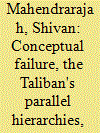

|
|
|
|
|
| Publication |
2014.
|
| Summary/Abstract |
ISAF exists to protect the Afghan constitutional model. This strategic objective will be defeated because the GIRoA model has a conceptual flaw that renders it incapable of delivering governance at the local level (Tier IV). This fatal flaw has enabled the Taliban, by developing parallel hierarchies, to displace GIRoA and establish itself in southern locales as the political authority. The Taliban are fighting a revolutionary war, a Maoist displacement strategy that uses guerrilla tactics to advance a political program. Petraeus and McChrystal failed to recognize the character of war, and believed the Taliban are pursuing an exhaustion strategy. They failed to devise a counter-RW strategy. The 'Surge' was doomed ab initio
|
|
|
|
|
|
|
|
|
|
|
|
|
|
|
|
| 2 |
ID:
129606


|
|
|
| 3 |
ID:
117975
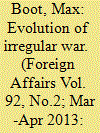

|
|
|
|
|
| Publication |
2013.
|
| Summary/Abstract |
Pundits tend to treat terrorism and guerrilla tactics as something new, but nothing could be further from the truth. Although the agendas have changed over the years -- from tribalism, to liberalism and nationalism, to socialism, to jihadist extremism -- guerrilla and terrorist warfare has been ubiquitous throughout history and consistently deadly.
|
|
|
|
|
|
|
|
|
|
|
|
|
|
|
|
| 4 |
ID:
133516
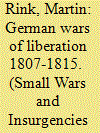

|
|
|
|
|
| Publication |
2014.
|
| Summary/Abstract |
In the Age of Napoleon, 'small wars' and 'revolutionary war' were closely connected. There were, however, different strands of this phenomenon: speaking professionally, conservative officers condemned small wars as an irregular regression to previous less disciplined forms of warfare. The Prussian state continually tried to discipline and regulate spontaneous risings. Yet the irregular character of small wars offered the opportunities for a less complex way of fighting, thus enabling the arming of the 'people' to fight. Individual undertakings, such as Ferdinand von Schill's doomed campaign in 1809, were designed to spark off a general popular uprising. But they were cheered by many and supported by few. Meanwhile, Neidhardt von Gneisenau conceived guerrilla-style Landsturm home-defence forces, which were designed for an irregular people's war. These concepts were put into practice in the 'war of freedom' - or 'war of liberation' - in 1813. Eventually both the mobilisation and the tactics remained regular, however, despite the emphatic appeal to a national 'people's war'.
|
|
|
|
|
|
|
|
|
|
|
|
|
|
|
|
| 5 |
ID:
133515
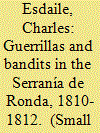

|
|
|
|
|
| Publication |
2014.
|
| Summary/Abstract |
The Spanish Guerrilla (1808-1812) which has given its name to ideologically motivated insurgencies is usually portrayed as a patriotic uprising against the French occupation forces of Napoleon. It was that, in part, but also many other things besides. This case study illustrates its overlap and convergence with banditry but also with social unrest turned into uprisings directed by poor Spaniards against their creditors, as in the storming of Ronda by insurgents in 1810. From the propaganda of the day to the subsequent Spanish patriotic historiography, there has been a tendency to exaggerate the amplitude of events and also the damage that was done to the French forces and the casualty figures inflicted on them.
|
|
|
|
|
|
|
|
|
|
|
|
|
|
|
|
| 6 |
ID:
133513
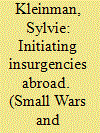

|
|
|
|
|
| Publication |
2014.
|
| Summary/Abstract |
Secret French plans to launch guerrilla-style raids on the British Isles devised in the spring of 1796 were referred to as 'chouanneries'. The name and concept behind these small-war operations were modelled on the irregular tactics used by the Chouan rebels in the Vendée, which the French state army had brutally quashed, but some wished to transfer into their institutional practice. Part of France's ongoing military strategy in the war against Britain, which included fomenting insurrection in Ireland, these irregular operations were to be manned partially by pardoned deserters and released convicts and prisoners of war. Of these, only Tate's brief invasion of Wales in 1797 was realised, but the surviving plans provide insightful historical lessons into an Anglophobic mindset shared by a small network of practitioners and policy deciders on the effectiveness of such shock and awe tactics. Largely motivated by the desire to take revenge for Britain's support of counter-revolutionaries in the Vendée, these plans could more aptly be referred to as counter-'chouanneries'.
|
|
|
|
|
|
|
|
|
|
|
|
|
|
|
|
| 7 |
ID:
133514
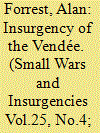

|
|
|
|
|
| Publication |
2014.
|
| Summary/Abstract |
The insurrection in the Vendée combined open warfare with the methods of petite guerre, ambushing French republican soldiers and cutting their supply lines to Paris. These tactics, when combined with the hatreds generated by a civil war, go far to explain to the cruelty of the conflict in the west and the depth of the hatreds it engendered. In republican eyes the use of guerrilla tactics was unjust and illegitimate, and they denounced their adversaries as common criminals and brigands, portraying them as backward, superstitious, even as subhuman, and in the process justified the savage repression they unleashed against them.
|
|
|
|
|
|
|
|
|
|
|
|
|
|
|
|
| 8 |
ID:
133518
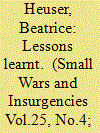

|
|
|
|
|
| Publication |
2014.
|
| Summary/Abstract |
Did participants in small wars in the period 1775-1831 learn from previous or contemporary examples? While this is difficult to prove for participants who left no written records, there is considerable evidence in existing publications by practitioners that they did indeed draw out lessons from recent insurgencies, either from their own experience or from events elsewhere which they studied from afar, especially the Spanish Guerrilla, which had already become legendary. Most authors showed an interest in how to stage insurgencies rather than in how to quell them. Even then, transfer did not come in a package of tactics-cum-values, but in each case in different configurations.
|
|
|
|
|
|
|
|
|
|
|
|
|
|
|
|
| 9 |
ID:
168209
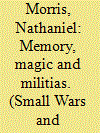

|
|
|
|
|
| Summary/Abstract |
Mexico’s Cora Indians have played an outsized role in national history, thanks to their skilful use of guerrilla tactics and success in forging strategic alliances with outside forces in defence of their cultural, territorial and political autonomy. Cora participation in elite struggles between Liberals and Conservatives (1850–73), and subsequently in the Mexican Revolution (1910–20), helped to shape the way that both conflicts played out in Western Mexico. Such participation also allowed Cora communities to keep hold of traditional landholdings in the face of political and economic reform, while sowing the seeds for the foundation of the Mexican state of Nayarit.
|
|
|
|
|
|
|
|
|
|
|
|
|
|
|
|
| 10 |
ID:
133517
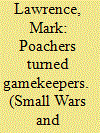

|
|
|
|
|
| Publication |
2014.
|
| Summary/Abstract |
This article modifies the associations made by historians and political scientists of Spanish guerrilla warfare with revolutionary insurgency. First, it explains how the guerrilla phenomenon moved from a Leftist to a reactionary symbol. Second, it compares the insurgency and counter-insurgency features of the Carlist War (1833-1840) with those of the better-known Peninsular War (1808-1814). Third, it shows how erstwhile guerrilla leaders during the Carlist War made their expertise available to the counter-insurgency, in a socio-economic as well as military setting. This article revises the social banditry paradigm in nineteenth-century Spain in the under-researched context of Europe bloodiest nineteenth-century civil war.
|
|
|
|
|
|
|
|
|
|
|
|
|
|
|
|
|
|
|
|
|